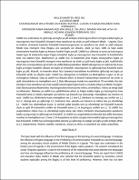| dc.description.abstract | The topic deals with the influence of the first language on the learning of a second language. It analyses the influence of Kigisu language on the Proficiency of communicative Kiswahili as a second language, among the secondary school students of Mbale District in Uganda. This topic was undertaken in the Eastern part of Uganda, in the environment of the Bagisu native speakers. The research considered the social- linguistic approach, a case for the existence of the relationship that exists between two languages and how one language influences the proficiency of a second language. There are report from UNEB and education stake holders in Mbale who reported that the Kiswahili spoken by secondary school students especially among the Bagisu is of low level of proficiency. However, there has not been
research to investigate and show how Kigisu influences the proficiency of communicative Kiswahili as L2. Besides, the past research shows clearly how L1 influences the learning of L2. The purpose of this research was therefore, to investigate and show the influence of Kigisu to the communicative language and proficiency on Kiswahili as L2. The researcher hypotheses that Kigisu influences the proficiency and the learning of Kiswahili as L2 grammatically. This research was guided by the inter-language theory which was used by the researchers to find out about the IL errors made by the learners of Kiswahili as their L2. It was supported by error analysis theory which was useful in error collection, error classification, error analysis, error description, and evaluation of errors. The data of the research was based on the interlanguage errors made by the learners of Kiswahili as L2, among the secondary students grammatically as observed in the communicative Kiswahili, among the secondary students whose L1 is Kigisu. The main source of the research was dialogue and oral exercises given to the students in secondary school. The data was analysed using the quantitative, qualitative and descriptive approach. The researcher found out that Kigisu influences the proficiency and the learning of Kiswahili as L2 grammatically. The interlanguage influence was observed in the transfer of L1 negative indicator to L2, transfer of nouns and verbs from L1 to the communication of L2 and transfer of sounds of L1 to L2 communication. The researcher concludes that the levels of interlanguage are based on the time given to the learner of L2, methodology, Learners attitude and the competence of L1 to L2. The researcher recommends that: 1) There should be measures to ensure that the influence of L1 to the learning and proficieny of communicative Kiswahili among the L2 Learners towards Learning Kiswahili is kept low; 2) The government should put in place a policy where Kiswahili is to be taught from primary schools to reduce on the level of interlanguage among secondary schools students. 3) The research proposes the use of liberal language teaching methods like communicative teaching method, groupwork and pair work for language learning, use of activity oriented teaching approach, balanced approach, and oral Kiswahili teaching should be given proper attention. All in all there is need for further reaseach on the influence of L1 to L2 to find remedy of reducing the influence of Kigisu on the communicative and proficiency of Kiswahili as L2 and other languages. | en_US |

